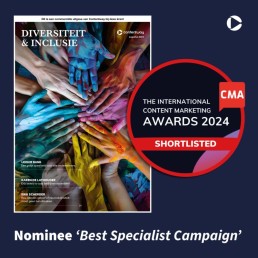The Content Marketing Association
One of the nicest editions of magazines from Contentway B.V. that I had the pleasure of working on, titled Diversity & Inclusion, has been nominated for an award from The Content Marketing Association. The magazines are distributed with various national media, in this case Het Financieele Dagblad.
Diversity and inclusion are topics that cannot be discussed enough, and reputable companies are leading the way. Read stories about their D&I policies here (only in Dutch): https://lnkd.in/eMva5HQf.
Contentway creates campaigns about specific topics in cooperation with various national news outlets, so contact them if you want to showcase your activities to a large audience (250,000+ readers). Congratulations to Eltjo Nieuwenhuis (head editor), Jelle Stekelbos (campagne manager) and Kiloe Van Benthem (design) and all fellow journalists with this wonderful publication and the nomination.
♻️ Are you working in the sustainability, social impact or health space, and sometimes need help with your content and/or visuals?
💚 At Sustainability Content Agency, we only work with copywriters, translators, designers and linguists who, like you, are committed to making the world a better place.
📢 Just drop us a line to see if we can cooperate together. We love every job, big or small.
